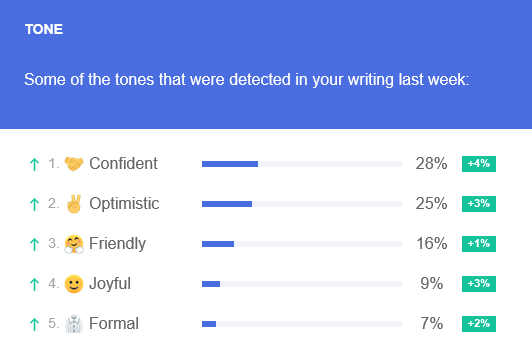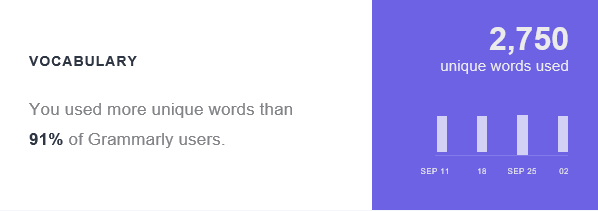During a review of my book I received some pretty harsh feedback about my writing skills. When I reviewed my writing, I had to agree they were right.
I installed Grammarly and it made a huge difference in my accuracy. But what I really love are the stats it cranks out. Check out this analysis of tone. It reflects how I feel about my subject areas: Confident!

But the stat that really captivates me is vocabulary: This week I used more unique words than most other people. Probably because I finally found a way to work the word anachronistic into a conversation!

Vocabulary is a sword that cuts both ways. When I speak to executives, complex words grab attention. I’m perceived as erudite (no, I didn’t have to look that up!). A strong command of language is a respected skill.
But when I’m coaching clients about communicating to the masses, simplicity rules the day. While I enjoy learning new words, many do not. They skip over what they don’t understand, leaving important gaps in the message. And in our diverse world, there is a high probability of having someone who doesn’t count English as their primary language in the audience. Even more so, TikTok users can’t give you more than 20 seconds to get the gist of your words. Dictionary checks are not an option.
There is a story in the Bible about a traveling Ethiopian who was reading scripture:
“Philip ran up to the chariot and heard the man reading Isaiah the prophet. “Do you understand what you are reading?” Philip asked.
“How can I,” he said, “unless someone explains it to me?” So he invited Philip to come up and sit with him.
I’m constantly amazed how people completely misinterpret what was supposed to be a clear communication. If we want change or a positive reaction, people must understand our words. So yes, that means choosing your words carefully.
But here’s the real point. Who is your interpreter? A memo or email is often not enough. Critical messages often require a translator who can rephrase in local terms that the audience will understand; who can give examples that connect with people.
The next time you need to issue an important communication, consider not only your audience but your interpreters. Equip them to relay your words accurately. Obfuscation is not the goal! If they need a glossary, you might want to reconsider your message.
Thoughtfully yours,
Jeff Skipper



